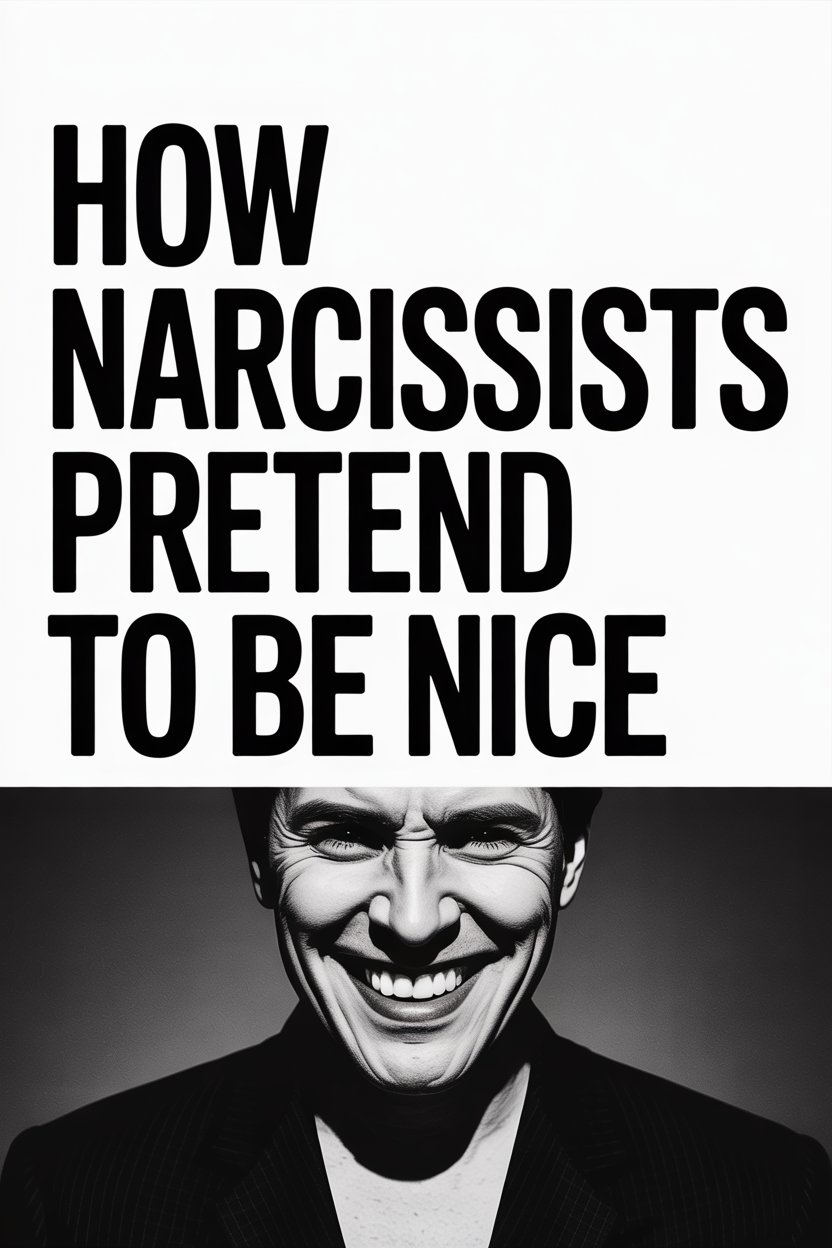Narcissists are the world’s finest actors—move over, Meryl Streep. On the surface, they can charm the socks off your nan, sweet-talk your mates, and leave even the most skeptical bartender with a warm fuzzy feeling.
But peel back the shiny wrapper, and the treat inside might just be hollow. If you’ve ever been bamboozled by a narcissist’s Oscar-worthy “niceness,” you’re hardly alone.
Let’s pull back the curtain on how narcissists can be oh-so-lovely, all while keeping their true motives tucked neatly out of sight.
The Grand Entrance: Love Bombing on Steroids
No one arrives on the scene like a narcissist out to impress. The first act is usually a full-on assault of flattery, gifts, and attention that borders on excessive.
Did you mention in passing that you like hot chocolate? Suddenly, seven different gourmet cocoa packets appear on your desk. Compliments rain down: your intelligence, your spark, the way you blink.
This isn’t because they’re just that into you. It’s a calculated effort to get you hooked—making you believe you’re the most remarkable human to ever grace their orbit.
The trick? They’re laying the groundwork for control, not connection. Every grand gesture comes with invisible strings.
Mirroring Your Every Move
Spend enough time with a narcissist and you may begin to feel like you’re dating your own reflection. They’ll adopt your hobbies, mimic your language, and even develop suspiciously similar worldviews.
At first, this uncanny resemblance feels like soulful compatibility—“We just get each other!”
Behind the scenes, this chameleon act is less about connection and more about manipulation. By becoming your ideal partner or friend, they win your trust and lower your defences. Who could suspect a soulmate of ill intentions?
The Generosity That’s Never Free
Narcissists love to play the hero. The friend who pays for dinner, the colleague who covers your shift, the partner who “rescues” you from minor inconveniences. Their generosity can seem boundless—at first.
Every act of kindness is recorded in their mental ledger. Later, when you least expect it, the bill comes due. Suddenly, you owe them: your time, your attention, maybe even your silence.
If you push back, you might be met with wounded confusion or outright anger. “After everything I’ve done for you!” Cue the world’s tiniest violin.
Playing the Victim While Wearing a Halo
When the nice mask slips, and it inevitably does, narcissists don’t take responsibility. Instead, the waterworks begin. They’re misunderstood. Unappreciated.
The world is out to get them—and you, of all people, should know better.
This clever victim routine isn’t a sign of vulnerability; it’s a tactic to keep you off-balance and sympathetic. Suddenly, you’re comforting them, apologizing for things you didn’t do, and reassuring them about their worth.
It’s emotional sleight-of-hand: while you’re busy soothing, they’re busy dodging accountability.
Public Angel, Private Tyrant
Narcissists put on their best show when there’s an audience. At a party, watch them glide from group to group, dazzling with wit and warmth. At home, the script changes.
Criticism, cold shoulders, or outright cruelty emerge when no one else is watching.
This two-faced performance sows confusion. If you dare mention their behind-the-scenes nastiness, mutual friends might look at you like you’ve grown an extra head.
After all, how could someone so charming be so callous? The narcissist counts on this disbelief to protect their reputation.
The Apology That Isn’t
Ever received an apology that leaves you feeling…well, less than satisfied? Narcissists excel at “sorry-not-sorry.”
Watch for apologies sprinkled with deflections: “I’m sorry you felt that way,” or “Mistakes were made.”
Genuine remorse requires empathy and introspection—traits narcissists struggle with. Their apologies are crafted to diffuse tension without ever admitting fault.
It’s a masterclass in saying the words but missing the point entirely.
Smothering with Attention
At the height of their “niceness,” narcissists can make you feel like you’re the center of the universe—texting constantly, planning outings, showering you with attention. It’s flattering, at first.
Look closer and this intensity is less about affection and more about control. They want your world to revolve around their needs, opinions, and preferences.
Miss a call, delay a text, or make plans without them, and the temperature drops fast. Suddenly, their attention turns ice cold.
The Friend to All, Loyal to None
Ever noticed how a narcissist seems to have a million “best friends”? Their social circles are wide but shallow. They’re quick with favors, compliments, and inside jokes—when it suits them.
But try leaning on them for genuine support, and you may find their interest wanes. Narcissists are experts at surface-level charm, but deep loyalty is rare.
If someone higher up the social food chain appears, don’t be surprised if you’re unceremoniously bumped down the list.
Love-Bomb Withdrawal
The early days of a narcissistic relationship are a dopamine-fueled fairy tale. Then, bit by bit, the energy fades. Texts go unanswered.
Compliments dry up. “Nice” becomes transactional, and every interaction feels loaded, as though you’re being tested and graded.
This withdrawal isn’t random. It’s a way to keep you guessing, off-balance, and desperate to win back their approval. The message: their affection is conditional—and you’d better work to earn it.
The Subtle Put-Downs
Just when you’re lulled into a sense of security, the narcissist’s “niceness” develops a sharp edge. Backhanded compliments and subtle digs slip into conversation.
Maybe it’s a joke at your expense in front of friends, or a “helpful” suggestion that leaves you second-guessing.
These little barbs are meant to chip away at your confidence while maintaining plausible deniability. After all, they were “just joking” or “only trying to help.” Gaslighting, anyone?
The Endless Scorecard
Narcissists never forget a “favor.” Good deeds are currency, and you’re expected to pay interest.
Did they help you move house last year? That’s worth at least six guilt trips and three last-minute babysitting requests.
Keeping tabs allows them to maintain leverage. Every kind act serves as both bait and bargaining chip. The message? Gratitude is never enough—you owe them, always.
What Can You Do Tonight?
If the lovely person in your life is starting to feel more like a master manipulator, you’re not powerless. Setting boundaries is your best weapon.
When the generosity starts to feel transactional, say thank you, but resist the urge to reciprocate out of guilt. Practice noticing when apologies are empty, and stop apologizing yourself for their feelings.
Trust your gut over their reputation. Notice who they are when no one’s around—not just who they pretend to be at dinner parties.
Surround yourself with people who don’t need to keep a scorecard. The world’s full of genuine folks who bring kindness without a catch—no acting skills required.


